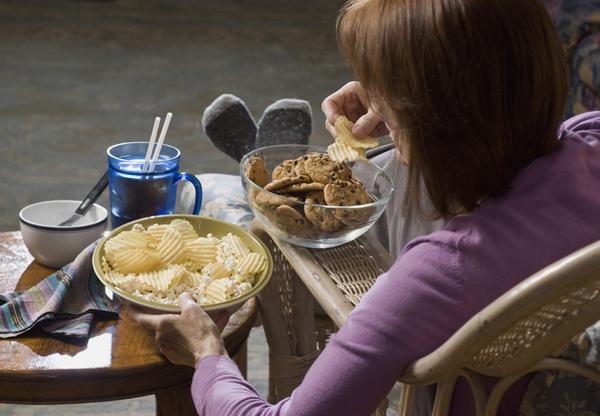How Junk Food Makes a Bad Mood Worse

If you think that order of jumbo cheese fries will help change your bad mood — think again.
Researchers at Penn State University have found that poor eating habits can actually worsen a person's mood, especially among women who are concerned about how they eat, according to PsychCentral.com.
To determine the effect eating choices have on mood, researchers gave 131 college-aged women small hand-held computers. The computers were programmed to prompt the women to answer questions about their state of mind and their eating behaviors several times each day.
The women chosen for the study were selected because they had not been diagnosed with eating disorders, though they had concerns about their eating habits and about their body weight and shape, according to a Penn State news release.
"There was little in the way of mood changes right before the unhealthy eating behaviors," Kristin Heron, research associate at Penn State's Survey Research Center, said in the news release. "However, negative mood was significantly higher after these behaviors."
Interestingly, participants who were in a good mood before eating experienced no significant change in their state of mind after unhealthy eating.
This study joins other recent research that finds food and mood inextricably linked. A 2012 study in the journal Public Health Nutrition revealed that people who ate junk food were 51 percent more likely to show signs of depression — and the more junk food the study participants ate, the more likely they were to be depressed.
Sign up for the Live Science daily newsletter now
Get the world’s most fascinating discoveries delivered straight to your inbox.
And an earlier study from 2010 found that people who show signs of depression ate more chocolate than people who weren't depressed.
But the relationship between food and emotions remains a complex one: In a 2013 survey of more than 1,300 psychologists, 43 percent cited "emotional eating" as a problem in weight loss — equal to the number who mentioned exercise as a problem.
The latest study, presented on March 15 at the American Psychosomatic Society conference in Miami, may be most significant because it reflects real-world situations encountered by average, healthy people.
"This study is unique because it evaluates moods and eating behaviors as they occur in people's daily lives, which can provide a more accurate picture of the relationship between emotions and eating," researcher Joshua Smyth, Penn State professor of biobehavioral health, said in the news release.
Email Marc Lallanilla at mlallanilla@techmedianetwork.com or follow him @MarcLallanilla. Follow LiveScience on Twitter @livescience. We're also on Facebook & Google+. Original article on LiveScience.com.










